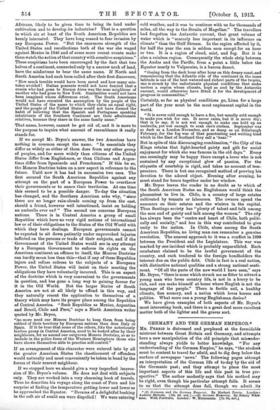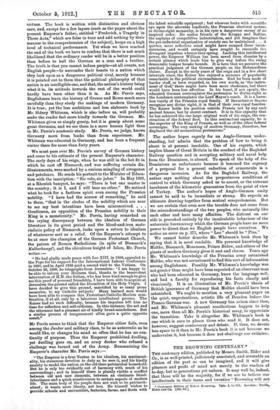GERMANY AND THE GERMAN EMPEROR.*
MR. PERRIS is distressed and perplexed at the formidable mistrust between Great Britain and Germany, and attempts here a new manipulation of the old principle that misunder- standing always yields to better knowledge. " For any understanding of the German Empire," he says, "the student must be content to travel far afield, and to dig deep below the surface of newspaper 'news.' The following pages attempt an interpretation of the German life of to-day by the aid of the Germanic past; and they attempt to place the most important aspects of this life and this past in true per- spective." The author modestly says that his method may be right, even though his particular attempt fails. It seems to us that the attempt does fail, though we admit . its • (1) Germany and the German Emperor. By Herbert Perris. London: Andrew Melrose. C12s. Bd. net.]—(2) German Memories. By Sidney whit- man. With Portraits. London : W. Heinemann. [7s. 6d, net.]
virtues. The book is written with distinction and obvious care, and, except for a few lapses (such as the pages about the present Emperor's father, entitled "Frederick, a Tragedy in Three Acts," which are false in tone and add nothing by their manner to the comprehension of the subject), keeps on a high level of technical performance. Yet when we have reached the end of the book we have to confess that there is not much likelihood that the ordinary reader will be in a better position than before to bail the German as a man and a brother.
The truth is that you cannot induce people—at all events, not English people—to surrender their hearts to a nation which they look upon as a dangerous political rival, merely because it is pointed out to them that the political philosophy of that nation is an intelligible one, and that, the nation's history being what it is, its attitude towards the rest of the world could hardly have been other than it is. As Mr. Perris says, Englishmen learn the history of Greece and Rome much more carefully than they study the makings of modern Germany. It is true ; yet the less ambitious and less elaborate book by Mr. Sidney Whitman, which is also before us, will probably make the reader feel more kindly towards the German. Mr.
Whitman gives us simply gossip, but it is gossip about some great Germans, and we see them in a more human light than in Mr. Perris's academic study. Mr. Perris, we judge, knows Germany more from books than from experience. Mr.
Whitman was educated in Germany, and has been a frequent visitor there for more than forty years.
We must pass over Mr. Perris's survey of German history and come to his estimate of the present Emperor's character. The early days of his reign, when he was still in the hot fit in which he cast off Bismarck, and was suffering certain dis- illusionments, were marked by a curious mingling of arrogance and petulance. He sends his portrait to the Minister of Educa- tion with the inscription: " Sic vole, sic jubeo." In May 1891, at a Rhenish banquet, he says " There is but one master in the country ; it is I, and I will bear no other." He noticed what he took for a factions spirit even among the Prussian nobility. "I have had the sorrow of remarking," he said to them, "that in the circles of the nobility which are near to me my best intentions have been misconceived. . . . Gentlemen, an opposition of the Prussian nobility to their King is a monstrosity." Mr. Perris, having remarked on the crying discrepancy between the idealism of German literature in its great period and the blood-and-iron mate- rialistic policy of Bismarck, looks upon a return to idealism of whatsoever sort as a relief. Of the Emperor's attempt to be at once the champion of the German Protestant Church, the patron of Roman Catholicism (in spite of Bismarck's Kulturkampf), and the chivalrous knight of Islam, Mr. Perris writes :-
" He had gladly made peace with Leo XIII. in 1888, appealed to the Pope for his support for the International Labour Conference in 1890, and in April 1893 paid a second visit to the Vatican. On October 26, 1898, he telegraphs from Jerusalem: I am happy to be able to inform your Holiness that, thanks to the benevolent intervention of H.M. the Sultan, who has been kind enough to give me this proof of personal friendship, I have been able to acquire at Jerusalem the ground called the llormition of the Holy Virgin. I have decided to give this ground, sanctified by so many pious memories, to my Catholic subjects.' Many learned men would have been able to compass this Protestant-Catholic-Moslem com- bination, if at all, only by a laborious intellectual process. The Kaiser had no such difficulty, because his impulses left him no time for reflection and self-criticism. In this instance, the act and the utterance had a pleasant air of kindly broad-mindedness. But a similar process of temperament often gave a quite opposite result."
Mr Perris seems to think that the Emperor either fails, even among the Junker and military class, to be as autocratic as he would like, or changes his mind so often that he has no con- tinuity of purpose. Thus the Emperor prohibited duelling, yet duelling goes on, and an army doctor who refused a challenge was turned out of the Army. Summarizing the Emperor's character Mr. Perris says :-
" The Emperor is a true Teuton in his idealism, his sentiment- ality, his strenuous devotion to duty as he sees it, and his kindly anxiety to model the nation on the old-time patriarchal household. But he is only too evidently out of harmony with much of his surroundings ; and in himself there is plainly visible a conflict between old and new elements, between an obstinate blood- inheritance and a quick sensitiveness to certain aspects of modern life. The main body of the people does not wish to be patriarch- alizerl ; it wants more liberty, not less. He himself wishes to provide .schools and universities, factories, farms, and fleets with the latest scientific equipment ; but whoever looks with scientific eye upon the absentee landlords, the Prussian electoral system, or divine-right monarchy, is in his eyes a dangerous enemy of an inspired order. Ho makes friends of the Krupps and Balling, the captains of competitive industrialism, and yet imagines that the pre-industrial organization of society can be maintained . . . A quieter, more reflective mind might have escaped these incon- sistencies, and would certainly have sought to reconcile the divergent impulses whence they spring. Lacking this intellectual power, the Emperor William has been saved from disaster by a certain pliancy which leads him to give way before the rising democratic temper breaks bounds. It is here that wo perceive the practical judgment of the German people on the Hohenzollern claims. Except in the early years of the reign and in a few short intervals since, the Kaiser has enjoyed a measure of popularity remarkable in the political circumstances. Had he been made of harder stuff, or been regarded, in his own words, as 'the instru- ment of God,' there might have been more obedience, but there would have been less affection. In his heart, if not openly, the educated German contemplates the pretension to divine-right as the Londoner contemplates the Lord Mayor's coach. It is a harm- less vanity of the Prussian royal family. If Bavarians or Saxons recognize any divine right, it is that of their own royal families. The Kaiser holds his position outside Prussia not by any such ancient tenure, but by recent contract. It is in this capacity that he has achieved the one large original work of his reign, the con- struction of the federal fleet. In this contractual capacity, ho is the superior of the King of Prussia, as well as of the other federal sovereigns. The very making of modern Germany, therefore, has displaced the old monarchical pretensions."
The author hopes eagerly for an Anglo-German under- standing, but admits that the problem of how to bring it about is at present insoluble. One of his regrets, which implies blame of Great Britain in the conduct of the Baghdad Railway question and in accepting military and naval help from the Dominions, is absurd. To speak of the help of the Dominions as unfortunate because it lessened the cogency of a proposal for a general reduction of armaments is a dangerous inversion. As for the Baghdad Railway, the author says nothing about the preposterous conditions of control to which Germany asked us to assent, or the extreme. harshness of the kilometric guarantees from the point of view of Turkey. The author's hopes of Anglo-German amity cannot be said to be immediate or strong. He expects an ultimate drawing together from mutual comprehension. But we are certain that even now the trouble does not come from the misunderstandings of the two peoples, who naturally like each other and have many affinities. The distrust on our side is provoked entirely by the incalculable behaviour of the autocratic bureaucracy which the German people have no more power to direct than we English people have ourselves. We notice an error on p. 375, where " Leo " should be " Pius."
We cannot better describe Mr. Whitman's book than by saying that it is most readable. His personal knowledge of Moltke, Bismarck, Mommsen, Prince Billow, and others of the giants of modern Germany gives it zest and charm. Years ago Mr. Whitman's knowledge of the Prussian army astonished Moltke, who was not accustomed to find this sort of information among Englishmen. Possibly Mr. Whitman's knowledge was not greater than might have been expected of an observant man who had been educated in Germany, knew the language well, and had a faculty for reproducing his facts clearly and vivaciously. It is an illustration of Mr. Perris's thesis of British ignorance of Germany that Moltke should have been astonished. We ought to mention a very pleasant paper on the quiet, unpretentious, artistic life of Dresden before the Franco-German war. A new Germany has arisen since then, and Mr. Whitman's pleasant recollections happen to help one, more than all Mr. Perris's historical essay, to appreciate the transition. Take it altogether Mr. Whitman's book is one which is sure to please those who read it. It does not, however, suggest controversy and debate. If, then, we devote less space to it than to Mr. Perris's book it is not because we undervalue it, but because it does not challenge our criticism.



































































 Previous page
Previous page